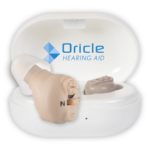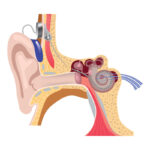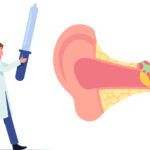Reducing Salt Intake to Reduce Tinnitus: A Comprehensive Study
Tinnitus is a condition that affects millions of people worldwide. It is characterized by a ringing, buzzing, or hissing sound in the ears that can be both annoying and distressing. While tinnitus is not a life-threatening condition, it can have a significant impact on a person's quality of life. Fortunately, there are several ways to manage tinnitus, including reducing salt intake. In this article, we'll explore the connection between salt and tinnitus, and how reducing salt intake can help manage this condition.
Understanding Tinnitus
Tinnitus is a condition that affects the auditory system, specifically the inner ear and is characterized by a persistent sound in the ear or head without any external sound source. The sound can be a ringing, buzzing, hissing, or roaring sound that can be constant or intermittent. Tinnitus can occur in one or both ears, and the intensity of the sound can vary from person to person.
Tinnitus can be caused by several factors, including exposure to loud noises, ear infections, head injuries, and age-related hearing loss. While tinnitus is not a disease, it can be a symptom of an underlying condition that requires medical attention.
The Connection Between Salt and Tinnitus

Salt, or sodium, is an essential mineral that our bodies need to function properly. However, consuming too much salt can have negative effects on our health, including tinnitus. When we consume too much salt, our bodies retain water to dilute the excess sodium. This can lead to increased blood pressure, which can damage the delicate hair cells in the inner ear that are responsible for transmitting sound to the brain. When these hair cells are damaged, they can produce the ringing or buzzing sound associated with tinnitus.
Research has shown a connection between high salt intake and tinnitus. In a study conducted in 2010, researchers found that people with a high salt intake were more likely to experience tinnitus than those with a low salt intake. The study also found that reducing salt intake could reduce the severity of tinnitus symptoms.
Another study conducted in 2018 found that reducing salt intake in people with tinnitus led to significant improvements in their symptoms. The study participants were asked to reduce their salt intake to no more than 1500 milligrams per day, and after eight weeks, they reported a reduction in the severity and frequency of their tinnitus symptoms.
Reducing Salt Intake to Manage Tinnitus
Reducing salt intake is one way to manage tinnitus. The American Tinnitus Association recommends that people with tinnitus limit their salt intake to no more than 1500 milligrams per day. This is roughly equivalent to two-thirds of a teaspoon of salt.
There are several ways to reduce salt intake, including:
- Reading food labels: Many packaged and processed foods contain high levels of salt. Reading food labels can help you identify high-salt foods and choose low-salt alternatives.
- Cooking at home: Cooking meals at home allows you to control the amount of salt in your food. You can use herbs and spices to add flavor to your food instead of salt.
- Choosing low-salt alternatives: There are many low-salt alternatives to common high-salt foods, such as low-sodium soy sauce and reduced-salt canned goods.
- Avoiding salty snacks: Snacks like potato chips, pretzels, and salted nuts are high in salt. Choosing unsalted alternatives can help reduce salt intake.
Benefits of Reducing Salt Intake

Reducing salt intake has several benefits beyond managing tinnitus. It can help lower blood pressure, reduce the risk of heart disease, and improve overall health. High salt intake has been linked to an increased risk of cardiovascular disease, stroke, and other health problems.
In addition, reducing salt intake can improve the effectiveness of certain medications used
to treat tinnitus. Some medications used to treat tinnitus, such as diuretics, work by reducing the amount of fluid in the body. When combined with a low-salt diet, these medications can be more effective at managing tinnitus.
Furthermore, reducing salt intake can improve the overall health of people with tinnitus, which can lead to an improvement in their quality of life. Many people with tinnitus report feeling stressed, anxious, or depressed due to the constant sound in their ears. By reducing salt intake and improving their overall health, they may experience a reduction in these negative emotions.
It is also important to note that reducing salt intake is just one part of a comprehensive treatment plan for tinnitus. Other treatments may include sound therapy, cognitive behavioral therapy, and medication. People with tinnitus should work with their healthcare provider to develop a treatment plan that is tailored to their individual needs.
Tips for Reducing Salt Intake
Reducing salt intake can be challenging, especially if you are used to consuming a lot of salty foods. Here are some tips to help you reduce your salt intake:
- Start slowly: Reducing salt intake is a process. Start by making small changes to your diet and gradually reducing your salt intake over time.
- Use herbs and spices: Instead of using salt to flavor your food, use herbs and spices. Garlic, rosemary, basil, and thyme are all great options.
- Choose fresh foods: Fresh fruits, vegetables, and lean proteins are naturally low in salt. Choose fresh foods instead of packaged or processed foods.
- Read food labels: When shopping for food, read the labels to determine the salt content. Look for low-salt or no-salt-added options.
- Avoid fast food: Fast food is often high in salt. Avoid fast food and choose healthier options when eating out.
- Be aware of hidden salt: Some foods, such as bread and cereal, can be high in salt. Be aware of hidden sources of salt in your diet.
Conclusion
Tinnitus can be a distressing condition that can significantly impact a person's quality of life. While there is no cure for tinnitus, reducing salt intake can help manage the condition. By limiting salt intake to no more than 1500 milligrams per day, people with tinnitus can improve their symptoms and overall health. It is important to work with a healthcare provider to develop a comprehensive treatment plan that is tailored to your individual needs. By following a low-salt diet and making other healthy lifestyle changes, people with tinnitus can experience an improvement in their quality of life.
Sources:
- Lobarinas, E. et al. “Salicylate-Induced Cochlear Damage and Tinnitus: A Review of Mechanisms.” https://www.ncbi.nlm.nih.gov/pmc/articles/PMC4026745/
- The Lancet. “Reduction of dietary salt for the prevention of cardiovascular disease: a systematic review of randomized controlled trials.” https://www.thelancet.com/journals/lancet/article/PIIS0140-6736(08)61158-3/fulltext
- American Heart Association. “Sodium and Salt.” https://www.heart.org/en/healthy-living/healthy-eating/eat-smart/sodium/sodium-and-salt







